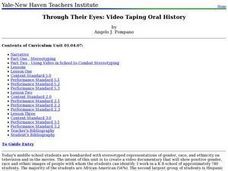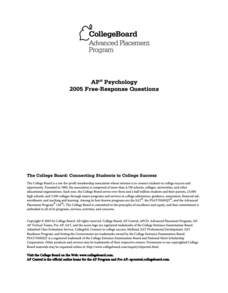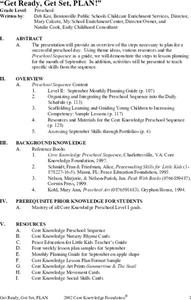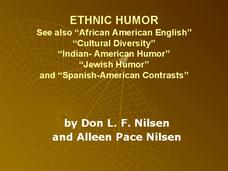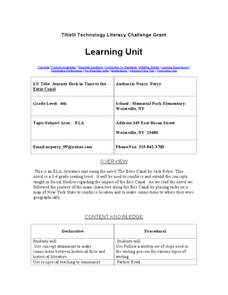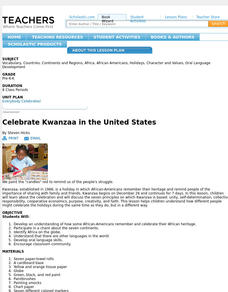Curated OER
Through Their Eyes: Video Taping Oral History
Students identify the stereotypes they are faced with on a daily basis. In groups, they use this information to identify the ways stereotypes are portrayed in movies and television. They use a video camera to record oral histories of...
Curated OER
Ancient Egypt
Pupils complete a series of activities to discover life in ancient Egypt. They create want ads for pyramid workers, design vocabulary flash cards and dictionaries, and research famous Egyptians. They also research the "Curse of the...
College Board
2005 AP® Psychology Free-Response Questions
How can diagnostic labels help children? Is hypnosis a useful tool or a fraudulent practice? An examination prompt explores controversies in psychology. A second, structured inquiry unpacks perception—and its various influences.
College Board
2015 AP® Human Geography Free-Response Questions
How are population and political power related? What is the significance of the globalization of English? Why do refugees leave their home countries? Using structured short-answer questions, scholars unravel complicated dynamics with...
Curated OER
Get Ready, Get Set, PLAN
Students complete the theme activities in the unit for the month of September. In this planning lesson, students complete various themed activities for the month of September. Students complete movement activities, autonomy and social...
Curated OER
Special Edition Newspaper on the Trial of Julius Caesar
Tenth graders research the multiple perspectives held by the participants in the trial relative to the conduct and outcome of the trial. Practice writing pertinent and penetrating interview questions for oral interviewing. Take a...
Museum of Tolerance
Cultural Research Activity
Class members explore cultural diversity through a variety of texts that showcase the importance of traditions. Then, they interview their family members to research their own cultural background and write their findings on quilt...
Curated OER
Understanding Folklife and Folklore
Student examine the basic characteristics of folklore. In this folklore lesson, students complete activities to identify two kinds of folk, folk groups, and folklife. Students list daily activities in their home, identify folk groups...
Curated OER
Ethnic Humor
Uncovering the function and forms of ethnic jokes, this presentation with enlighten your students as it explores the concept of "insiders vs. outsiders" and various examples of ethnic stereotypes in literature and society. The...
Curated OER
Erie Canal: Journey Back in Time
Fourth graders read the novel, The Eric Canal, identifying the characters and setting. They respond to daily reading by writing in journals and complete a short answer test upon completion of the novel.
Curated OER
Celebrate Kwanzaa in the United States
Students explore and study the celebration of Kwanzaa in which African-Americans remember their heritage and remind people of the importance of sharing with family and friends. They participate in a chant about the seven continents and...
Curated OER
Holocaust Theme
Students complete a unit of lessons on the events of the Holocaust during WWII. They write daily journal entries, create a collage, view and discuss videos, read and analyze novels and poetry, and complete a novel project.
Smithsonian Institution
Solomon G. Brown: Letter Writing
Personal correspondence in the form of letters is not as common as it once was. This resource presents an opportunity for you to introduce your class to letter writing and cover topics in social studies. Learners read a letter written in...
Curated OER
Slang Ain't the Thang!
Students examine how a speaker uses words and images to express a message. They read a speech written by Sojourner Truth and discuss the purpose and audience, and identify the speaker's tools used in a speech by George W. Bush.
Curated OER
Traveling with Flat Stanley
pupils use the internet to gather geographical data about a state of their choice. Using new vocabulary, they describe the features present in the state, its climate and attractions. They develop a PowerPoint presentation to share...
Curated OER
Let's Go Camping!
Students view and use visual texts to gain and present information, become familiar with and use appropriate technologies eg. publish writing on computer, use photographs to record events, use video to record events.
Curated OER
Now One Foot, Now the Other
Second graders, working as a whole class, with partners or small groups, use various Web sites to investigate the relationship between generations.
Curated OER
PowerPoint Postcards
Third graders use the internet to research three facts about a country, state or habitat of their choice. Using this information, they create slides in PowerPoint to connect the information. They share their slides with the class and...
Curated OER
Celebrate Kwanzaa in the United States
Explore the components of the African American celebration of Kwanzaa in the United States. Complete with learning objectives, a materials and preparation list, and eight days of lesson plans, the resource incorporates the principles of...
Curated OER
Civic Engagement for Us?
Students identify the different forms of civic engagement. They identify their responsibilities at the different levels of government. They also analyze young leaders running for office.
Curated OER
Learning About Maps
Students take a "field trip" with the teacher through the school then draw a diagram of what they saw. They bring the maps to the computer lab where they create electronic maps using the software program Neighborhood Map Machine.
Curated OER
The Perfect City
Young scholars analyze group influences on people, events and culture. They design their own perfect society and report it to the class.
Curated OER
American Families: Portraits of African-American Families
Students develop a greater understanding and appreciation for their families. They increase personal self-esteem and pride as a result of studying about families through literature. They assess the importance of family values and...
Curated OER
Farm Census
Young scholars disuss the work of a farmer. They recognize and name farm animals to represent the information in a pictogram.
Other popular searches
- 49 Daily Oral Language
- Daily Oral Language Practice
- Daily Oral Language Packets
- Daily Oral Language 7th
- Daily Oral Language 9th
- Daily Oral Language 8th
- Daily Oral Language Commas
- Daily Oral Language Help
- Daily Oral Language Sentences
- Daily Oral Language Worksheets
